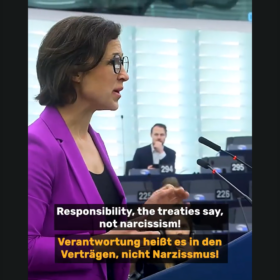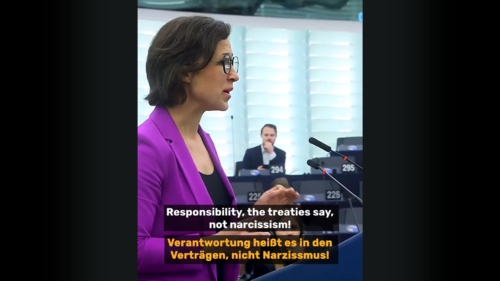Last Thursday our campaign #SHEcurity was launched. The aim: Together with WIIS, the Munich Security Conference & Southern Voice, the Allbright Foundation German magazine CFFP and other organisations, we want to raise awareness about the many women who have done great things in the field of peace and security- at last the end of October marks the 20th anniversary of the UN resolution 1325“Women, Peace and Security”. We also want to take stock: What about gender equality in foreign and security policy? How many years will it take before we achieve parity in various areas of the sector?
#SHEcurity: who inspired you?
The first day of the campaign was already very successful: Personalities such as Canadian Prime Minister Justin Trudeau, Danish Defence Minister Ank Bijleveld and Canadian Defence Minister Harjit Sajjan, activist and Nobel Peace Prize winner Nadia Murad and many others tweeted and posted about women in the sector who have inspired them personally. Given that many politicians, organisations and others at EU level took part, #SHEcurity even trended on Belgian Twitter.
You are currently viewing a placeholder content from X. To access the actual content, click the button below. Please note that doing so will share data with third-party providers.
More Informationhttps://twitter.com/MinBijleveld/status/1319262797944016896
The index: where do we stand, and how long will it actually take?
To be able to effectively advocate for more women in foreign and security policy, we need to know where we stand today. This is why the campaign developed the #SHEcurity Index. The first edition focuses on data from the EU, its member states and the G20 in six different categories: Politics, diplomacy, military, police, civilian and military missions and the economy.
You are currently viewing a placeholder content from X. To access the actual content, click the button below. Please note that doing so will share data with third-party providers.
More InformationPolitics: Women are increasingly represented in national parliaments, but it will take almost 100 years before parity is reached in parliamentary foreign and defence committees.
Diplomacy: Although women represent 43% of the diplomatic corps, only about 25% of EU and G20 ambassadors are women.
Military: Currently, women make up about 11% of armes forces − and this number is rising, albeit very slowly: it will take about 325 (EU) and 465 (NATO) years to achieve parity, based on progress made between 2009 and 2018.
Police: Police forces (of the countries represented in the index) have a proportion of women of 25%. If progress continues at the same speed as between 2009 and 2017, parity will only be achieved in 58 years.
Civil and military missions: While we will only need about 5 years to reach parity in the leadership positions of UN peacekeeping missions, the share of women in the military personnel of these missions is less than 5%. The situation is even worse for EU missions: no woman has ever been commander and/or deputy commander of a military CSDP mission.
Business: Women make up only 6% of board members of arms manufacturers in Germany, compared to 23% in the USA. This figure is much lower than the number of board members of companies in other economic sectors.
So there is still a lot to be done!
The launch of the report was taken up by different media, for example Politico, Spiegel, euractiv, RND, La Vanguardia or evangelisch.de, as well as by the European Commission:
You are currently viewing a placeholder content from X. To access the actual content, click the button below. Please note that doing so will share data with third-party providers.
More Information
You are currently viewing a placeholder content from X. To access the actual content, click the button below. Please note that doing so will share data with third-party providers.
More InformationWithout women, peace is difficult to achieve. This is one reason why we need all data (without gaps) on how many women are working in Peace and Security to become available. And – wherever possible – we need quotas. But it is also clear that a higher share of women alone is not enough; structural changes are needed. One day after the launch of the #SHEcurity campaign, my and MEP Ernest Urtasun’s report on gender equality in EU foreign policy was adopted by the Parliament. An important first step!
Check out what it is all about in this video:
You are currently viewing a placeholder content from Youtube. To access the actual content, click the button below. Please note that doing so will share data with third-party providers.
More Information











